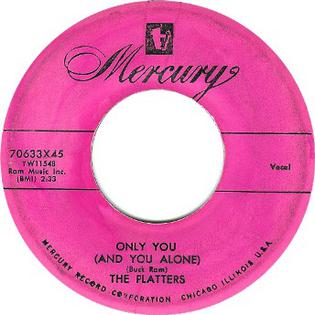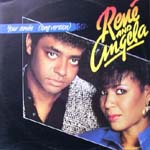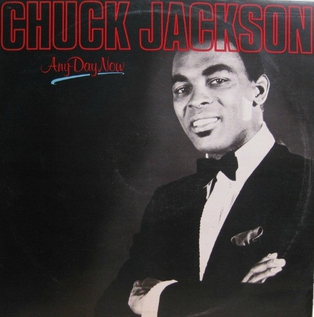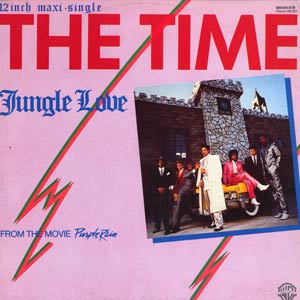Related Research Articles

"Only You (And You Alone)" (often shortened to "Only You") is a pop song composed by Buck Ram. It was originally recorded by The Platters with lead vocals by Tony Williams in 1955.

"Family Affair" is a 1971 number-one hit single recorded by Sly and the Family Stone for the Epic Records label. Their first new material since the double A-sided single "Thank You "/ "Everybody Is a Star" nearly two years prior, "Family Affair" became the third and final number-one pop single for the band. In 2021, Rolling Stone magazine ranked the song 57th on their list of the 500 Greatest Songs of All Time. The cover version by John Legend, Joss Stone, and Van Hunt, won the Grammy Award for Best R&B Performance by a Duo or Group with Vocals at 49th Annual Grammy Awards.
Cheryl Lynn is an American singer and songwriter. She is best known for her songs during the late 1970s through the mid-1980s, including the 1978 R&B/disco song "Got to Be Real".

"Since I Don't Have You" is a song written and composed by Jackie Taylor, James Beaumont, Janet Vogel, Joseph Rock, Joe Verscharen, Lennie Martin, and Wally Lester. It was first a 1958 hit single for the doo-wop group the Skyliners on the Billboard Hot 100. Country music singer Ronnie Milsap had a hit with the song in 1991. American hard rock band Guns N' Roses also had some success in 1994 with their version of the song which reached the top 10 on the UK Singles Chart.

"Stay" is a doo-wop song written by Maurice Williams and first recorded in 1960 by Williams with his group the Zodiacs. Commercially successful versions were later also issued by the Hollies, the Four Seasons and Jackson Browne.

"Your Smile" is a song by American singing duo René & Angela. Released on February 5, 1986, it was the third single from the duo's 1985 album, Street Called Desire. "Your Smile" was the duo's second number-one single on Billboard's R&B chart. It was also a minor hit on the Billboard Hot 100 peaking at number sixty-two. Along with the track "Drive My Love", "Your Smile" was a minor hit on the U.S. Dance chart, peaking at number forty-seven.

"Go Away Little Girl" is a popular song written by Gerry Goffin and Carole King. It was first recorded by Bobby Vee for Liberty Records on March 28, 1962. The lyrics consist of a young man asking a young attractive woman to stay away from him, so that he will not be tempted to betray his steady girlfriend by kissing her. The song is notable for making the American Top 20 three times: for Steve Lawrence in 1963, for The Happenings in 1966, and for Donny Osmond in 1971. It is also the first song, and one of only nine, to reach US number 1 by two different artists. Also notable in each of the solo versions is the similar double-tracked treatment of the singer's voice.
"(Now and Then There's) A Fool Such as I" is a popular song written by Bill Trader and published in 1952. Recorded as a single by Hank Snow it peaked at number four on the US country charts early in 1953.

"Swept Away" is a song by American R&B singer Diana Ross for her album of the same name. Ross released the song as the album's second single on August 14, 1984, by the RCA. It was written by Daryl Hall, Sara Allen and produced by Hall and Arthur Baker. Ross wrote the spoken lyrics at the beginning of the song and Hall also provided background vocals on it.

"I'll Be Good to You" is a 1976 hit song by R&B duo the Brothers Johnson. George Johnson, one of the two Johnson brothers in the band, wrote the song after deciding to commit to a relationship with one woman, instead of dating several at a time. While George was recording a demo for the song, family friend Senora Sam came by and added some lyrics. Brothers Johnson producer and mentor Quincy Jones heard the song, liked it, and convinced George to sing lead on the finished track. Released from their debut album, Look Out for #1, it was a top-ten hit on the Billboard Hot Singles Charts, peaking at number three, and a number one song on the Billboard R&B Charts during the summer of 1976. The single was later certified gold by the RIAA.

"Fire" is a song by R&B/funk band Ohio Players. The song was the opening track from the album of the same name and hit No. 1 on both the Billboard Hot 100 and the Hot Soul Singles chart in early 1975. It spent two weeks atop the soul chart. "Fire" was the Ohio Players' only entry on the new disco/dance chart, where it peaked at No. 10. The song is considered to be the band's signature song along with "Love Rollercoaster".

"I'm Still in Love with You" is a song originally recorded by Al Green. Released from the album of the same title, the single spent two weeks at #1 on the Hot Soul Singles chart in August 1972. It also peaked at #3 on the Billboard Hot 100 singles chart that same year. It would eventually sell over one million copies and is considered one of his most popular songs. Billboard ranked it as the No. 59 song for 1972.

"Any Day Now" is a popular song written by Burt Bacharach and Bob Hilliard in 1962. It has been recorded by numerous artists over the years, including notable versions by Chuck Jackson in 1962, Alan Price in 1965, Elvis Presley in 1969, Scott Walker in 1973 and Ronnie Milsap in 1982. In the lyrics, the singer predicts the imminent demise of a romantic relationship and describes the sadness this will leave.

"What You Won't Do for Love" is a song by American singer-songwriter Bobby Caldwell. It was released in September 1978 as the lead single from his eponymous debut album (1978). It was written by Caldwell and Alfons Kettner, and produced by Ann Holloway. The song has been covered and sampled numerous times, including by Tupac Shakur in the posthumous 1998 hit "Do for Love".

"Circles" is a song by the American band Atlantic Starr, and the first single released from their 1982 album Brilliance. The single was the most successful for the group thus far, peaking at number two for two weeks on the Soul Singles chart and it also became their first single to hit the Billboard Hot 100, peaking at number 38. "Circles" was also Atlantic Starr's most successful single on the dance charts, peaking at number nine.
"Funny How Time Slips Away" is a song written by Willie Nelson and first recorded by country singer Billy Walker. Walker's version was issued as a single by Columbia Records in June 1961 and peaked at number 23 on the Hot C&W Sides chart. The song has been featured in several live action films and television shows, such as in the first episode of the second season of AMC’s Better Call Saul and in the 2020 Netflix drama The Devil All the Time.
"Don't Let Go" is a song written by Jesse Stone. The song was first a hit for Roy Hamilton in 1958. The Roy Hamilton version reached number 2 on the R&B charts and number 13 on the pop charts.
"Please Help Me, I'm Falling" is a 1960 song written by Don Robertson and Hal Blair and first recorded by Hank Locklin. The single was Locklin's most successful recording and was his second number one on the country charts. "Please Help Me, I'm Falling" spent 14 weeks at the top spot and spent nine months on the country chart and crossed over to the Hot 100 peaking at number eight.

"Angel in Your Arms" is a song composed by Herbert Clayton Ivey, Terrence Woodford, and Tom Brasfield, which was a 1977 Top Ten hit for Hot, and also a Top Ten country hit in 1985 for Barbara Mandrell.

"Jungle Love" is a song from The Time's third album, Ice Cream Castle.
References
- ↑ "Official Singles Chart on 26/08/1984". Official Charts Company.
- ↑ Matos, Michaelangelo (8 December 2020). "Mann's Chinese Theatre, Hollywood: July 26, 1984". Can't Slow Down: How 1984 Became Pop's Blockbuster Year. Hachette Books. p. 182. ISBN 978-0-306-90337-3.
- ↑ Whitburn, Joel (2004). Top R&B/Hip-Hop Singles: 1942-2004. Record Research. p. 368.
- ↑ Whitburn, Joel (2004). Hot Dance/Disco: 1974-2003. Record Research. p. 162.
- ↑ "Encore Track listings". Discogs.com . Retrieved 20 June 2016.